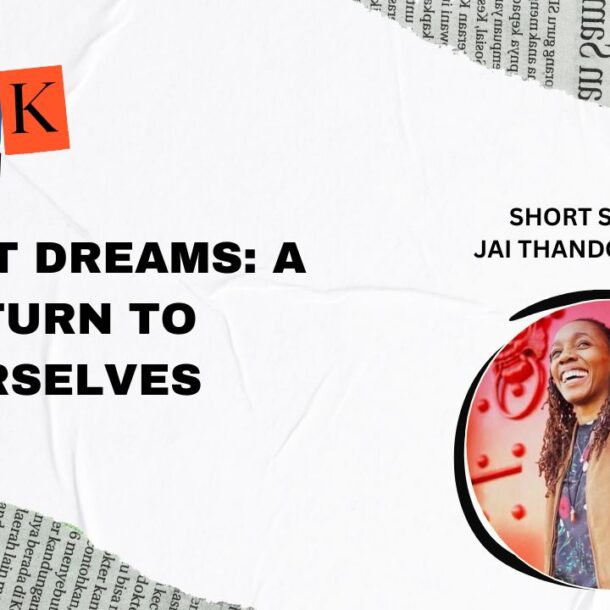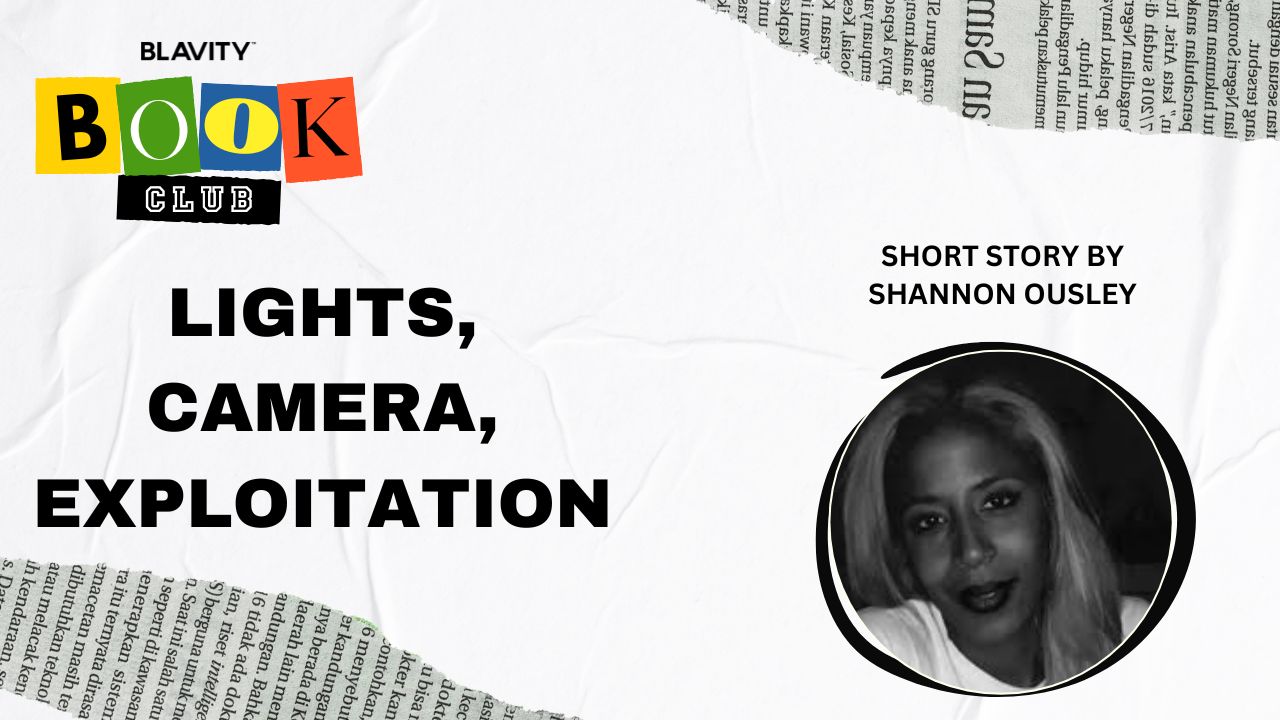
Stay
UpdateD
Join the BPC
Email List
Stay up to date on exciting projects and upcoming events from the Black Promoters Collective.

Whether you’re a seasoned wordsmith or just getting started, this is your space to shine.
Each Blavity Short Story is a reflection of the voices that captivate, challenge and celebrate the beauty and complexity of Black experiences. So bring us your magic—your joy, your truth, your imagination.
Together, we’re building a literary future where every voice matters.
“What happened to you? You used to be such an inspiration,” a college friend says, pumping the keg at a weekend BBQ. I rattle off about projects in development before quitting mid-sentence. We both know discussing my slate fails to conceal that, spiritually, I’m a shell of myself. Writing and filmmaking have absolutely saved my life, but at what cost? The game is rigged! I’ve failed to process this because I’m burnt out. Maybe it’s millennial angst. Or perhaps it’s hormones raging from “the abortion.” Who aborts the baby of a multi-millionaire? The day after my appointment, I opened my laptop and let it rip. It was that or kill myself—instead of a baby, a TV pilot was born.
As I hammered away, wiping back tears, I finally heard my “voice” fill the room, neutralizing the emptiness and despair. This pilot was the best thing I’d ever written. Over two years and dozens of Zoom calls, I’d learn that industry folks understood how I felt that night. It was refreshing after years of Hollywood rejection because all I wanted when I became a writer was to be heard.
In Spring 2017, I arrived in LA to work on a TV show I’d followed in the press. My excitement was immediately extinguished by another writer in the lobby. He bluntly informed me it was sheer beginner’s luck that I was sharing the same space as him. This conversation I didn’t ask for would set the tone for my Hollywood experience for the next seven years.
I’ll call the main victimizer “Bossman” or “Dr. Jekyll” and “Mr. Hyde”. He saw my weakness from day one, skimming my one-page resume as my nervous knee bobbed. He saw I had no real support, a transplant with a negative checking account. He saw my innocence and naive trust in anyone promising to help make my dreams come true. My entire identity was shaped by my mom’s death weeks before my high school cotillion. The vultures cosplaying as family and
friends desecrated and dismantled us, leaving my siblings and me for dead, literally less than a few hours after my mom took her last breath. In that lobby, he saw it all. Over time, he’d refer to that moment often, fondly smiling at what seemed to be his biggest catch to date.
I’d only agreed to be a personal assistant if I received time off for film endeavors. While fulfilling daily tasks—scheduling, packing, food orders, juice runs, wake-up calls, team babysitter—I’d exchange inspiration with Bossman. He’d reference humanity’s genius from those conversations in his work, validating that I was contributing to something bigger.
The first time Mr. Hyde surfaced was when I shared my first film. After a long day of press events, I shared it on the big screen as he and his permanent wingman changed clothes. They cut it off after the first scene, claiming they only wanted to confirm my “blonde hair era” was real. “No one has time for an 80-minute student film.” They laughed as I chuckled off the humiliation. Dr. Jekyll explained later that “artsy conversations” were just for us. I knew then I’d signed up to wrangle a posse of clout clowns where my real use was to be mined for taste, authenticity, and ingenuity.
Over the next year, I poured into mood boards and decks to enhance Bossman’s projects across entertainment sectors. The more I helped elevate his brand, the less creative our conversations became. Resentment brewed as I morphed into a one-woman creative machine—speech editing, rap lyric approving, out-styling stylists, onboarding real artists, setting tones, showing people with money how to spend it. This s**t was working; we were both growing. Other women on his team even began to rock Jays and braids (my trademark look) to appear useful.
As I gained confidence, my vision outgrew the artist I worked for. I could no longer sit there explaining why a gay love story will win an Oscar (it did) or have salad tossed at my head for forgetting dressing. Two and a half years in, I’d reached my fork in the road. We both knew it, and s**t got weird. The final straw came during a live radio show recording. With my brother in attendance, Bossman freestyled, dropping bars insinuating that– I BE SUCKING HIS DICK! I didn’t react despite the tension choking the room. I just stood stageside, holding his tea, waiting for the night to end. Sleep-deprived from touring, I was hours from being home. Mr. Hyde suddenly changed the show’s run, telling the band to play a song emphasizing women’s strength (which his musical legacy was built on). As they struggled to find the beat, my brother motioned me outside.
“So. what are you going to do?” he asked, handing me a cigarette.
“What do you mean?”
“Did I hear what I thought I heard?”
I shrugged, too embarrassed for eye contact. His dark, sad eyes read: “I can have some Russians pull up on him.”
“It’s not that deep.”
“Wait. Oh! No! I have never hooked up with that man!”
“I didn’t assume so, but whatever he was trying to get at, it’s very disrespectful.” Working for this dude was no longer an option.
In the green room, the usually rowdy band and crew fell silent upon my entrance. P checked on me, pouring tequila shots. We downed them, easing back into familiar banter. Jokes began, but P and I idled in silence. A band member cracked, “If all I have to do is juggle balls to get that good insurance, sign me up!” P, the youngest, shut them down with rare attitude. I escaped while everyone closed out, retrieving my bag from Bossman’s truck. He entered just as I connected with an Uber driver.
“Shannon? Are you okay? Where are you going?”
“Um, home.”
“Are you okay? Did I do something?”
“I don’t know. Did you do something?”
“Come on, let’s get in the car.”
I shouldn’t have gotten in. I was already so drained by the last six months of drama between us that I was unfazed by his lame-ass attempt at public shaming. I had quit for the third time a few weeks before the tour kicked off. We can blame it on a bunch of surface-level bulls**t, like I only prepared one tea instead of two before he hit the stage, but the truth is my ideas no longer served his brand and my creative appetite had grown exponentially in a short amount of time. I was starving and ready to go. But he still needed an assistant, and I still needed to pay rent, so we negotiated a peace treaty for the next three months, and up until the freestyle, we were on our best behavior, and the tour had been flawless.
In the suburban’s middle row, he asked again if he’d done something wrong. I hissed, “Why THE f**k would you EVER imply that I hooked up with you on stage?! In front of all those people?” His eyes lower, and like a mad dog foaming at the mouth, Mr. Hyde loses it. Spit flies into my face as he punches my headrest over and over again. Screaming—
“I hate you! I f**king hate you! You are the worst assistant I have EVER had! I have never had these problems before!” (Righhhht.)
The driver slows down almost to a stop, overcome with fear. I burst into tears and instinctively dial P, but this only enrages Bossman further, and I drop the phone, sobbing inconsolably like I’m six again as he beats the s**t out of everything in the car but me. He jumps out and taunts me. “Oh, please! Stop crying. You’re so fake!”
He chucks his phone at the stop sign and screams obscenities about me being an actor and always playing victim at the top of his lungs. I crawl to his side of the car, swing the door closed, and lock it. I beg the driver to take me home. He stops about fifty feet ahead of Bossman instead. I plead with him not to let him back in the car by saying he will probably kill me. The deep concern in his face tells me that although he had been working with Bossman for about a decade, tonight he had no idea who this person was. Still, cash is king. I don’t pay the driver’s bills, so he is willing to risk having blood on his hands.
The driver jumps out, urges Bossman to get back in before anyone sees us. As Bossman returns to his rightful place, he screams into his shattered phone, on speaker with his current girlfriend, who asks if I’m okay. The distress in my tone as I proclaim Bossman is having a meltdown prompts him to jump back out of the car. I gasp as my door flies open but it’s just P. She pulls me out and ushers me into her Uber. Find My Friends saved my life.
The next day, safely in my bed, I ignored fifty calls from Bossman’s team and dialed my Mentor instead. He’s the guy if you need a guy in Hollywood, and he has a way of making the most severe situations seem hilarious. He cackled as I recounted events and implored for direction.
“That’s easy! They owe you a year’s salary.”
“I can’t ask for that! The HBIC (head bitch in charge) keeps texting me to meet! I can’t talk to them!”
“Shannon! Put your f**king big girl panties on. You can’t avoid this. Take the meeting, then send her a follow-up email detailing what y’all discussed!”
I hung up and crawled under my bed until I could no longer avoid new messages. Bossman and the band were about to hit the stage for the real LA concert. They’d just left a meeting where Bossman claimed I’d been antagonizing him from the start. He asked anyone who disagreed to leave immediately. No one moved. In a room full of women, they all stayed and co-signed his narrative.
My anger over this information made me come out from under the bed and put my big girl panties on. On a call with the HBIC, I expressed, “The radio recording had a live audience of dozens of white women in the front row with their camera phones out. If just ONE of them is the feminist they claim to be, they might beat me to it and take Bossman down and us with him.” A couple of back-and-forths and a fifteen-page NDA later, I received my payout. Most of Bossman’s crew are women. From that day on, whenever I bumped into any of them in the real world, they seemed to be conveniently laced with a new designer bag (usually identical to one of the few I collected during my employment). One of them even boasted about being able to pay a year’s rent for her new apartment. They also flaunted their title changes and promotions on social media, and the one who worried so dearly about her child’s education could suddenly afford an elite private school.
Forty-eight hours later, I flew to Paris to put space between myself and the last three years. For three months, I traveled worldwide, working on scripts and connecting with artists. A brush with sepsis in Germany, while COVID-19 shut down the world, brought me back to LA. I convinced my producing partner to relocate from Brooklyn to LA so we could continue developing our projects. And that’s what we did all of lockdown. Our apartments became a refuge for artists searching for their voices. We had enough talent, style, taste, joy, and rage to insulate us from identity politics and the collapsing world. Four short films, three feature scripts, and two pilots later, the world reopened.
One afternoon, I received an apology text from Bossman, breaking the NDA. Clearing the air transitioned into regular hangouts. He pointed out who was trustworthy, who was a fraud, who wanted to f**k me, and who genuinely loved me—an exercise to regain my trust. He even vetted my new crew, offering opportunities he’d never follow through on. A twisted game, reestablishing that he knew me best. Somehow, Bossman convinced me that life’s secret was having a baby with your best friend. A soulmate. That night, I was his soulmate. The truth is, it was the end of the world, and I was exhausted, so we got to f**king.
A month later, I called from the hospital after a night of too much fun at the Hollywood Bowl. I wasn’t dying; I was pregnant. I might as well have been speaking French initially because what he heard was PREPOSTEROUS! So I repeated myself.
“Wha– What! Shannon! I don’t want to have another baby!”
“WHAT THE F**K DO YOU MEAN YOU DON’T WANT TO HAVE ANOTHER BABY? THAT’S EXACTLY WHAT YOU SAID YOU WANTED!”
I was disgusted with myself, disgusted that blinding desperation to find my people had clouded my judgment. As Bossman downgraded to a calmer response to elicit a better outcome, I’d already made my decision. After what I’ve been through, no matter how much I wanted to start a family, my pregnancy announcement will never be met with shock, indecision, and I-was-just-kiddings.
Months later, when Roe v. Wade was overturned, I was overwhelmed with shame. My careless actions had led to a procedure that was now illegal in 18 states. Feeling consumed by humiliation, I had no option but to devote all that I had left to my dreams. I revised and wrote multiple drafts of this TV show in the hope of moving past my disappointment. However, the feedback remained the same: “How did this affect the main character? Not the character loosely
based on you, but the man. How does he feel about what occurs in each scene?”— Apparently, how my story impacts a man is what people care about. Got it! It was nauseating to see my own trauma sensationalized in those meetings—I am both a victim and a perpetrator. For what? An Academy Award? A family? I still don’t have either!
When I started this essay, I was going to quit this industry. But by the time I arrived here, I realized storytelling is the only way I know to stand up for myself. Although the #MeToo movement largely left Black women’s experiences in Hollywood alone, the success of TV series like Baby Reindeer and I May Destroy You have given me small hope that there is room for marginalized people to share their stories. As we navigate the post-#MeToo era, it’s crucial to critically examine the stories we tell and how we tell them. The power of storytelling can effectively challenge the patriarchal regime we are all suffering under if we address the root causes of sexual violence and harassment through our narratives and advocate for systemic changes. It may possibly be our only chance at creating a truly equitable society.
Lastly, you’re probably wondering why I haven’t mentioned this guy’s real name. It’s NOT to protect him. It’s NOT because I’m afraid to spend years in court or paying lawyers (I have receipts). It’s more powerful to channel all this rage, all the f**kery, all the unbelievable experiences into a television show. So when you hear about the show, see me at the Emmys, and it’s on screen… then you’ll know who He is. I hope it serves as a cautionary tale to inspire youth pursuing dreams in this industry and anyone who’s experienced something similar. So to that young lady who just bought a one-way ticket to Hollywood and is excited about the next chapter, remember: ears up and eyes open, because to them, you are just prey.
Shannon Ousley is a writer, director and author originally from Cleveland, Ohio. Shannon has worked on an array of projects — from books to commercials to films and television — after discovering the power of storytelling. She is currently developing her feature film, Foodstamps (based on her memoir Dear Nikki), with Stephen Love attached to produce. Shannon was recently a finalist on Issa Rae’s Project Greenlight. Her comedy pilot, Like Family, is also being developed with Rob Weiss and Michael C. Martin attached to produce. Shannon is also working on a documentary/scripted project about controversial figure Redd Foxx, titled My Friend Redd. In early 2024, she wrapped production on her fourth short film, How to Find Your Voice, starring Lexi Underwood. Shannon produced, wrote and directed the film.
Stay up to date on exciting projects and upcoming events from the Black Promoters Collective.

©2025 Black Promoters Collective (BPC) All Rights Reserved.